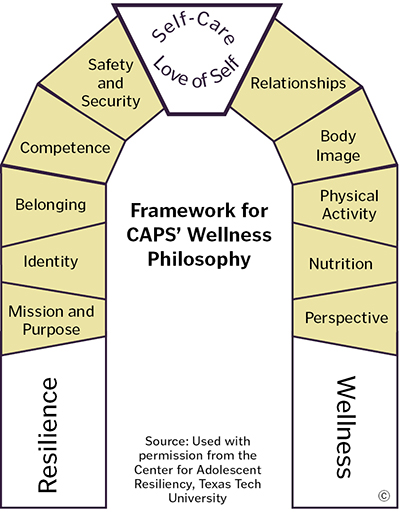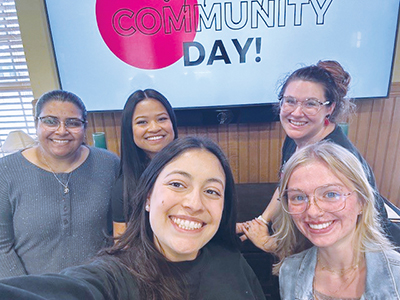"Children require the presence of at least one caring person who can provide support for healthy development and learning, engender trust and love, and convey compassion, understanding, respect and interest."1
When the time comes to transition from an alternative school setting back to their original or traditional school, students at risk often struggle. Challenges include falling behind academically, returning to negative influences from peer groups, and difficulty readjusting to a less structured environment.2 These students often find themselves caught in a revolving door between the alternative educational setting and their original school.
To empower and advocate for these students, the Community Advocacy Project for Students (CAPS) in Lubbock, Texas, provides focused support through trained and caring adults.3 The vast majority of participants receiving services are secondary students recognized as at-risk, many of whom have been placed in alternative education due to disciplinary infractions.
Most of the young people that CAPS works with are encountered first in alternative placement, but others are referred by school counselors and administrators who believe that the student would benefit from additional support from another caring adult. CAPS trains volunteers to serve as advocates for the young participants and as liaisons for educators and administrators. By being a consistent and caring presence in their lives, advocates help demonstrate to students that their voices matter.
ROOTED IN MIND/BODY RESEARCH
CAPS is housed within the Center for Adolescent Resiliency at Texas Tech University in Lubbock. From 2008 to 2018, the center partnered with Providence member Covenant Health on a project called the Covenant
BodyMind Initiative to promote comprehensive adolescent wellness in schools. Covenant's initiative began as an outreach project to address the prevalence of childhood obesity in Lubbock and the surrounding communities.
The project eventually produced multiple curricular platforms, which provided students in grades 6-12 in traditional school settings an all-encompassing approach to what it means to be healthy — physically, mentally, emotionally and spiritually. Covenant BodyMind Initiative staff started teaching the curriculum in a couple of local schools while also providing the curriculum and training to area teachers who wanted to implement it in their classrooms. Through this holistic lens, the issues of a vulnerable population became evident, as staff witnessed some students struggling to get back on track in a traditional school setting after transitioning there from alternative education, where they had been sent due to behavioral issues.
Based on these observations, the Center for Adolescent Resiliency built close working relationships with local secondary school leaders, who increasingly articulated struggles for students transitioning back to the traditional classroom. For some students, the alternative setting was (and is) a juvenile justice/correctional facility. As a result, CAPS grew from its original initiative of addressing childhood obesity to one focusing on an emergent need to help students transition back to a traditional educational setting.
With the approval and blessing of Covenant Health, the Covenant BodyMind Initiative staff developed an advocacy pilot using the project's wellness curricula and adapted the program schedule to accommodate time to work one-on-one with these students (with parents' permission), starting with most at their alternative education setting before following them to their traditional schools later.
CAPS' first program was a six-month pilot in 2018 during the fall semester, and it received additional support from a Wellness and Prevention Community grant from Covenant Community Health Outreach and the resiliency center. Since then, CAPS has paired advocates with nearly 340 students in grades 6-12 through one-on-one support and has additionally served more than 600 students through small group facilitation.

HOLISTIC PROGRAMMING
Grounded in a comprehensive wellness philosophy, CAPS programming addresses the whole child physically, socially, emotionally and behaviorally (as shown in the side graphic). With a focus on life skills development,
the curriculum addresses topics such as healthy relationships, identity, emotional security, physical safety and belonging. It serves as a foundation for the development and adaptations necessary for CAPS' skill-building program focus.
For students served through the program's one-on-one advocacy, weekly meetings take place between the advocate and student at their traditional school during a time that works well with the student's schedule and does not interfere with core classes. These meetings last 30 to 60 minutes and explore goal setting and obstacles through wellness lessons, activities and discussions. Advocates use this time to build rapport, explore struggles and offer support. Additionally, if advocates see that students are experiencing any personal challenges or barriers outside the classroom, they help serve as a conduit to relay those needs to the school counselor so students and their families can be connected to appropriate community resources. As shared through a CAPS survey about the program, one student wrote: "I hardly have people that will listen, but you guys listen."
CAPS advocates also facilitate groups throughout the Lubbock Independent School District to support students struggling with issues such as grief and loss, emotional regulation and bullying. Activities are designed to meet the social-emotional needs of the students, helping them develop skills that empower and move them forward.
EXPANDING TO SUMMER PROGRAM OFFERINGS
The idea of summer often brings thoughts of joy and excitement for children and families. However, this is not the reality for the many students that CAPS serves. It is not uncommon for advocates
to eagerly return from the summer and reconnect with their students, only to discover they have either left the school district or their whereabouts are unknown. For these students, summer may include a lack of extracurricular and relational involvement
and resources, along with unsupervised time and increased access to risky situations and activities.

With the assistance of community partners, CAPS piloted programming in 2024 to keep students and volunteers connected through the summer break. CAPS Summer Site, hosted at a church's gym in Lubbock, offered young people a safe place to connect with CAPS advocates and their peers by participating in art, sports and nutrition challenges. Each week had a wellness theme that influenced activities planned for the day, as well as allowing for free time. Whether painting, jewelry-making, basketball, pingpong or cornhole, students and advocates engaged in fun competitions, calming exercises and opportunities to gather during lunch.
End-of-summer reflections with participants offered valuable insight. Students learned new skills and had something to look forward to each week. Highlights identified by students were socialization, learning new skills, exploring emotional regulation, having access to an all-inclusive and supportive environment and being exposed to different types of physical activity. Based on the success of this pilot, CAPS plans to increase the frequency of meetings during the summer of 2025.
DIVERSITY DEFINES ADVOCATES
The program's advocates include community members with diverse professional and personal backgrounds who share a desire to help adolescents reach their full potential. Serving as an approved practicum
and internship site and service-learning partner for multiple programs, CAPS attracts many future practitioners from diverse areas of interest.
CAPS prepares and empowers advocates to effectively work within the school system and make a positive impact on their assigned students. Advocates are required to pass background checks with both the Lubbock Independent School District and Texas Tech and successfully complete training led by the CAPS team. With financial support from Providence's Well Being Trust, CAPS also enriches advocate experiences by hosting events that inspire discussion, offer additional training and provide new curricula.
Although CAPS is designed to impact youth participants, reflections with advocates show the impact is reciprocal. "My student truly has changed my life and shown me the power of patience, understanding and human connection," one advocate shared in a CAPS program survey.
Advocates' motivation to serve varies. Some get involved to gain professional experience; some want to be supportive adults to struggling young people; and others are fulfilling a class assignment. Some advocates were considered at-risk when young and realized the difference that one caring adult can make. Ultimately, all advocates report gaining something of value through their experience.
All young people deserve someone who believes in them, who sees their potential and is determined to help them see it as well. They need to know that their community values them and is rooting for their success. CAPS provides that support.
INSTRUMENTAL COLLABORATIONS
According to an African proverb, "It takes a village to raise a child." CAPS has passionate partners, both internal and external, who create a powerful village for our students.
Collaborations are at the heart of the CAPS program. CAPS could not exist without the generosity and shared passion of others. Covenant Health's initial grant allowed the program to begin its work and pursue its vision. Since then, Covenant Health has continued to offer counseling for participating students and their families free of charge to support the overall wellness of our community.
All young people deserve someone who believes in them, who sees their potential and is determined to help them see it as well. They need to know that their community values them and is rooting for their success. CAPS provides that support.
Because it is affiliated with Texas Tech, the project collaborates with several academic units, including Counselor Education (in the College of Education) and Nutritional Sciences and Human Development and Family Sciences (in the College of Health and Human Sciences). These collaborations provide curriculum and program evaluation expertise as well as educational experiences through internships, practica and community-engaged learning opportunities. The partnerships prepare future practitioners and provide the project with a steady stream of motivated volunteers to keep our impact strong and open the door to authentic engaged scholarship.
Collaborations allow CAPS to be a vital liaison between health experts, school personnel and highly trained and passionate volunteers. CAPS is proud to serve the youth of our community and to be an avenue for passionate community members to get involved and learn from their experiences.
"I have never worked with a program that has provided more reliable, relevant, meaningful support of students than CAPS," said Kristen Lewis, a counselor with Monterey High School in Lubbock who has collaborated with CAPS for several years. "[Advocates] quietly walk alongside these kids as they navigate life in a nonjudgmental and supportive way. They are authentic and genuine in the relationships that they build and they refuse to quit on a student."
AMY ONOFRE is the director of the Community Advocacy Project for Students in the Center for Adolescent Resiliency at Texas Tech University in Lubbock, Texas.
NOTES
- Erik K. Laursen and Scott M. Birmingham, "Caring Relationships as a Protective Factor for At-Risk Youth: An Ethnographic Study," Families in Society: The Journal of Contemporary Social Services 84, no. 2 (April 2003): 240-246, https://doi.org/10.1606/1044-3894.101.
- Brianna L. Kennedy, Melanie M. Acosta, and Olivia Soutullo, "Counternarratives of Students' Experiences Returning to Comprehensive Schools from an Involuntary Disciplinary Alternative School," Race Ethnicity and Education 22, no. 1 (2017): https://doi.org/10.1080/13613324.2017.1376634.
- "Community Advocacy Project for Students (CAPS)," Texas Tech University Center for Adolescent Resiliency, https://www.depts.ttu.edu/hs/car/caps/index.php.
